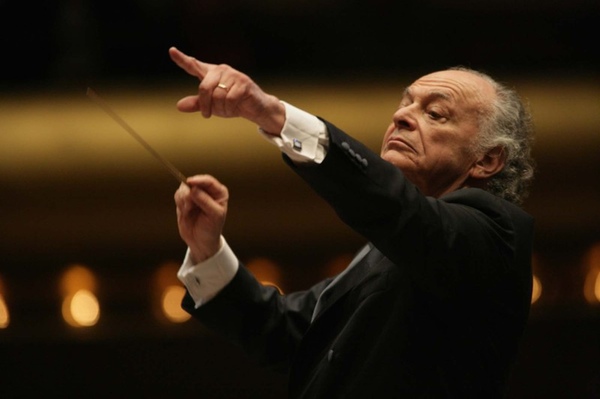Conductor Lorin Maazel's apprenticeship program features young instrumentalists and singers from around the world. Photograph courtesy of the Castleton Festival.
Top pick in my summer classical music round-up went to the Castleton Festival, the month of opera and concerts organized by conductor Lorin Maazel at his summer house in Rappahannock County. The event continues to grow in scope, as Maazel expands the facilities on his property and bring more performers into the program, which is an apprenticeship for young musicians. This year, the Castleton Festival Orchestra was composed of young members of the Qatar Philharmonic Orchestra, the Bilken University Orchestra (from Ankara, Turkey), London’s Royal College of Music Orchestra, and American conservatory programs. In a remarkable gesture of confidence in their abilities, Maazel took them on a mini-tour this year, to give gala concerts at the Blackcreek Summer Music Festival in Toronto and at the Music Center at Strathmore in North Bethesda, heard last Thursday night.
The program was a challenging one, too, bringing together music inspired by two of Shakespeare’s plays, Romeo and Juliet and A Midsummer Night’s Dream. Two Hollywood stars, Helen Mirren and Jeremy Irons, were the obvious draw for the nearly sold-out crowd, but they appeared only on the second half, entering the hall to a warm ovation. On the model of previous Shakespeare-themed concerts by the Folger Consort—The Fairy Queen in 2007 and The Tempest in 2010—the actors read texts from the play, interlaced with music inspired by it. The excerpts were woven together with a fairly prosaic narration by poet J. D. McClatchy, and both Mirren and Irons slipped between it and speeches by Shakespeare’s characters. Mirren was a regal Titania, but it was Irons who had the most fun, as a spiteful Oberon, playful Puck, and deep-voiced Bottom, complete with hilarious gestures and expressions.
Maazel led his young orchestra through Mendelssohn’s incidental music for the play. Portions of the score, like the devilishly fleet “Scherzo” and the omnipresent “Wedding March,” are quite familiar, but it was good to hear less familiar parts that were intended to be played under or in alternation with dialogue. A small chorus of women served for some of the fairy music, with solo work from sopranos Joyce El-Khoury, a little brittle and under-powered, and Tharanga Gonnetilleke, richer and smoother in sound. The difficult violin part of this score put that section through its paces, not always with felicitous results, but the horn section especially distinguished itself with solid, beautiful playing. The orchestra was in better shape in the first half, in bombastic excerpts from Prokofiev’s ballet version of Romeo and Juliet and Tchaikovsky’s Fantasy-Overture derived from the same play.
A trip down to the home base of the Castleton Festival on Friday night provided a chance to take in the second performance of this summer’s production of Puccini’s La Bohème. As Maazel showed in last year’s production of Il Trittico and in his many recordings, he is a great Puccini conductor, and he gave this performance of La Bohème, somewhat remarkably his first attempt at what is perhaps the composer’s most over-performed score, considerable flair and individuality. It is easy to make this opera into mawkish twaddle, either by exaggerating its sentimentality or by trying to make it into something it is not. The festival’s resident stage director, William Kerley, wisely kept the production simple, half-updating the setting but without altering so much of the story that it became unrecognizable. My overall enjoyment of the performance is a tribute to the earnestness of the young singers, probably just as much as Kerley’s direction.
As at last year’s Il Trittico, baritone Corey Crider as Marcello stood out for the power and refinement of his voice. Tenor Brian Jagde first started singing as a baritone, but he has developed a pleasing ring in his upper range, only thinning out a bit dangerously around high C, as in the big aria Che gelida manina. Joyce El-Khoury, pulling double-duty at the Shakespeare gala concert and as Mimi, was understandably a little worn out vocally but acted with admirable energy. Suzanne Vinnik had enough wattage as the shrewish Musetta, although she sang her big aria, Quando me’n vo’, at a grotesquely slow tempo, with even more self-indulgent rubato.
The only drawback of the growth of the Castleton Festival over the last few years is that it has grown past its former intimacy. The charm of the much smaller theater in Maazel’s original house on the property was that the stage was so small and so close, creating a comfortable acoustic for young singers. Similarly, the temporary theater tent structure built for the festival in 2009 was cruder, but the stage was surrounded by the audience seating. All of that intimacy has been lost in the larger Festival Tent space now in use: A proscenium keeps the singers at a distance, and a large orchestra pit, flanked by wooden walls that act as acoustic panels, makes the instrumental sound a bit overbearing (the brass entrance at the death of Mimi was crushing to the ears) and amplified many minor ensemble issues within the orchestra and between the stage and the pit, especially during the somewhat unwieldy chorus numbers. The site still has all the charm it ever had, including the fresh air and gorgeous views at intermission, but for the future, there will hopefully be a way to recapture some of the smallness of the festival’s origins.
The production of La Bohème is repeated on July 10 and 16. The Castleton Festival continues through July 24. Students may qualify for special $20 tickets: contact the Castleton box office. If you cannot make the trip to Castleton Farms, WETA (90.9 FM) will be broadcasting some of the festival’s performances.
Subscribe to Washingtonian
Follow Washingtonian on Twitter
More>> After Hours Blog | Arts & Events | Happy Hour Finder | Calendar of Events

















